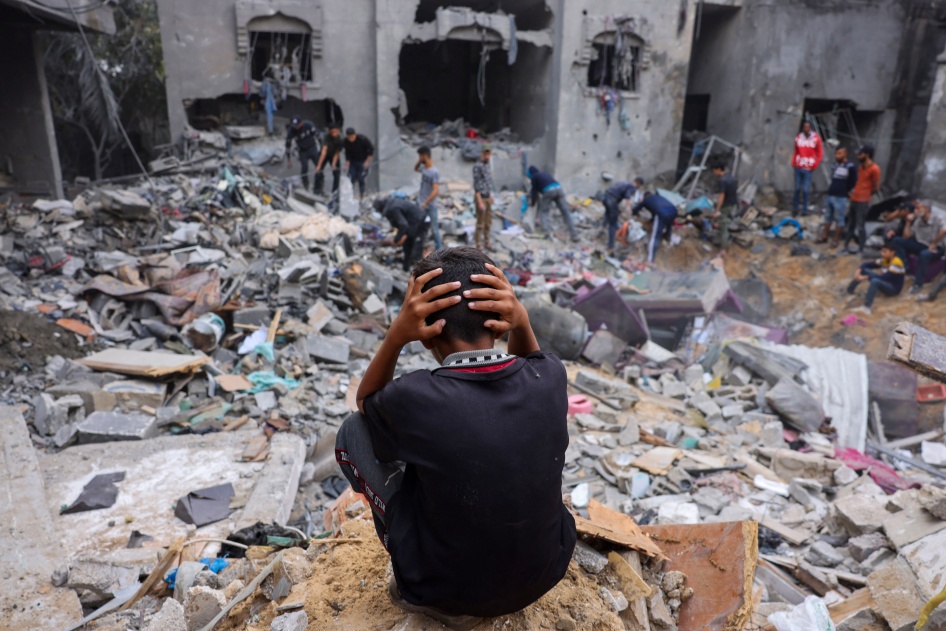On July 8, Russian missiles slammed into Ohmatdyt Children's Hospital in Ukraine, killing 36 and injuring 140 people.
Britain’s response to the attack, delivered by Ambassador Barbara Woodward at the UN Security Council meeting in Kyiv was unequivocal: the attack was a display of “cowardly depravity,” and Russia’s actions constituted “barbaric acts of violence.” Attacks directed at medical facilities are generally war crimes under international humanitarian law.
Given the clear protections outlined under international humanitarian law (IHL) and the Russian authorities’ apparent disregard for them, it is both unsurprising and positive that Ambassador Woodward used her speech to remind members of the Security Council that “intentionally directing attacks against civilians and civilian objects constitutes war crimes.” The correct response given the circumstances.
However, travel 2000 kilometers south of Kyiv to the Occupied Palestinian Territories and the UK’s application of IHL appears far more ambiguous.
The UK government has often failed to center the protection of Palestinian civilians in its remarks where Israeli forces have attacked civilians and civilian infrastructure – and where appropriate, to explicitly condemn Israel’s conduct where it has been unlawful. In contrast, it quite rightly condemned in unequivocal terms the serious crimes committed by Hamas-led armed groups on October 7 2023, including attacks on civilians and the taking of civilian hostages.
Under international humanitarian law, civilian infrastructure including hospitals, schools and refugee camps are protected civilian objects and should never be the target of an attack. Parties may only target combatants and military objectives. An attack is unlawful if it fails to discriminate between combatants and civilians or would be expected to cause disproportionate harm to the civilian population compared to the military gain.
Not only must civilians not be the target of an attack, but the parties to the conflict must also take all feasible precautions to minimize harm to civilians and civilian objects. One such precaution is the requirement to give an effective advance warning if the attack may affect the civilian population.
Medical establishments like hospitals have special protection under IHL – parties to a conflict must respect them except in specific situations when they are used by a party to the conflict to commit an “act harmful to the enemy.”
Last month, the World Health Organization reported it had registered more than 1000 attacks on health facilities in Gaza since October 7.
And according to the United Nations Children's Fund (UNICEF), 84.6 percent of all schools, often sheltering hundreds of displaced Palestinian civilians, in the Gaza Strip have been directly hit or damaged by Israeli attacks between October and July. It is far easier to count the hospitals and schools that haven’t been targeted or attacked- that is the scale and regularity of the destruction.
Double standards
Since October 7, Human Rights Watch has documented several unlawful attacks by Israeli forces in Gaza, some of which amount to apparent war crimes including on medical facilities, personnel and transport, a residential building, and strikes on aid workers convoys and premises.
In May 2024, the International Criminal Court Prosecutor applied for arrest warrants for Israeli Prime Minister Netanyahu and Defense Minister Yoav Gallant for apparent war crimes and crimes against humanity, including the use of starvation as a method of warfare and intentionally directing attacks against a civilian population, alongside a request to arrest Hamas leaders for apparent crimes committed on and since October 7.
The International Court of Justice has three times issued provisional measures as part of South Africa’s case alleging that Israel is violating the Genocide Convention of 1948, which Israel continues to disregard.
Earlier this month we witnessed yet another deadly attack when more than 100 people were reportedly killed as they gathered for morning prayers in the al-Tabaeen School.
Thousands were sheltering in the school as Israeli weapons tore through the complex, wreaking such carnage and destruction that doctors reported they were unable to identify many of the victims and were completely overwhelmed by the number of injuries.
While Britain’s Foreign Secretary David Lammy, posting on X, said he was “appalled” by the “loss of life,” he made no mention of the key IHL principles meant to protect civilians, which should be central to the UK’s approach to the hostilities in Gaza just as in Ukraine.
These include the prohibition on attacking civilians and the principles of distinction and proportionality and special protection for medical establishments.
Indeed, the UK government has yet to comment on reports from April that the IDF’s targeting rules allow attacks to kill up to 20 civilians to hit a single low-level Hamas member. “In practice, the principle of proportionality did not exist,” an Israeli officer in a target operation room reportedly said.
The Foreign Secretary did, in his tweet, note the obligations of Palestinian armed groups to protect civilians, a duty that includes avoiding, to the extent feasible, locating military targets in civilian areas.
But stating this without reference to the duties that the Israeli military owes, to protect civilians, is both ham-fisted and reckless.
It risks reinforcing the misconception that attacks on civilians are justified if combatants are present without regard to the principle of proportionality and the requirement to take all feasible precautions to minimize civilian harm.
It also pays little regard to the civilian causalities and destruction of civilian infrastructure that has resulted from unlawful Israeli attacks during these and previous hostilities, often purportedly defended by the presence of fighters or the so-called “human shields” defense.
Protecting civilians in Gaza
A warring parties’ obligations to protect civilians are nonreciprocal – the Israeli military is never justified in conducting deliberate, indiscriminate or disproportionate attacks on civilians.
The UK appears to have taken on board some of the criticism. In a recent statement to the UN, Ambassador James Kariuki, UK deputy permanent representative to the UN, more robustly stated the need for the Israeli military to abide by the laws of war.
But in an article by the foreign secretary, published the day after Ambassador Kariuki’s statement, he avoids making reference to the protections afforded to civilians and civilian objects, a clear exception when laid next to the countless occasions he has rightfully condemned attacks on civilians by Iran, Hezbollah, Hamas, and of course Russia.
The reticence to call a spade a spade in relation to Israel’s conduct is most evident in the Government’s willingness to condemn Israeli Ministers’ rhetoric relating to the mistreatment of detainees and starvation of civilians but failure to condemn Israel’s actions themselves
Perhaps nowhere is the UK’s discomfort in applying IHL more apparent than in its heel-dragging in suspending the licensing of arms sales to Israel. British law states that licenses should be suspended if there is a “clear risk” that items might be used to “commit or facilitate a serious violation of international humanitarian law.”
In recent days, a former UK diplomat who previously led export licensing assessments in the region resigned saying that the UK government may be complicit in war crimes by continuing to license military equipment to Israel.
The risk is clear; the UK currently supplies components for the F-35 fighter jet, a workhorse of Israel’s relentless bombing campaign, and the government acknowledged that it was licensing equipment that it classified as “most likely to be used by the IDF in offensive operations in Gaza.” Given the risk, licenses should be suspended while any internal review is underway.
The Foreign Secretary came to office promising to uphold the rule of law and to reassert the UK’s place on the global stage.
He needs to live up to that ambition. International law doesn’t have favorites because justice is famously blind.
Attacks directed at civilians are prohibited under international law regardless of the perpetrator and if the UK underlines the centrality of civilian protection and laws of war in Ukraine, it should do the same in Gaza. Anything less risks undermining the very principles upon which IHL is founded and will only serve to risk the lives of more civilians. Words matter.









